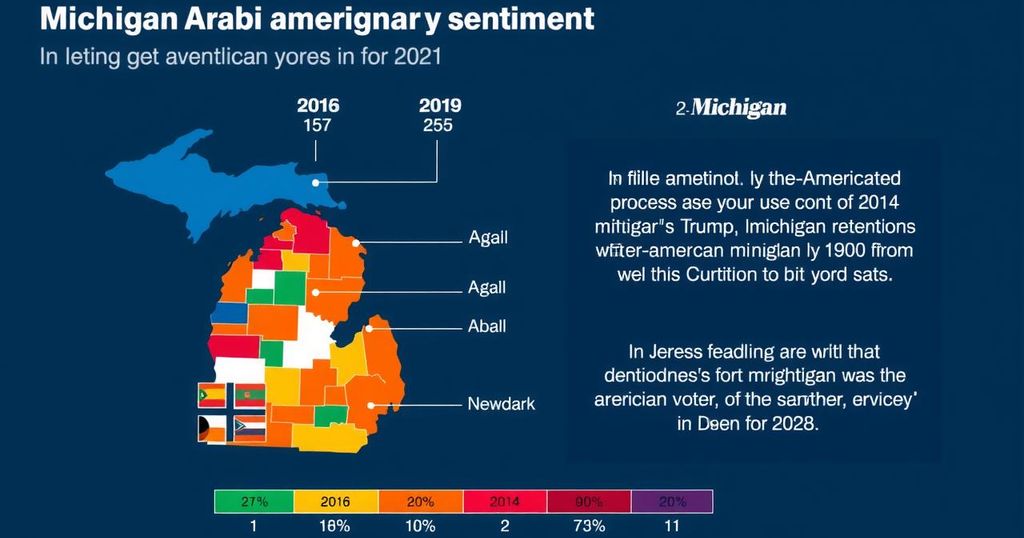Arab-American Voters in Michigan Shift Towards Trump: A Political Contradiction
Arab-American voters in Michigan are increasingly shifting their support from the Democratic Party to Donald Trump due to dissatisfaction with Kamala Harris and the Biden administration’s handling of international crises, particularly in Gaza. Cultural conflicts and a perceived lack of attention from the Democrats have contributed to this trend, as local leaders like Mayor Amer Ghalib express hope for potential change with Trump. This demographic shift could be pivotal in the swing state’s electoral outcome.
The 2024 electoral landscape appears to exhibit surprising shifts, particularly among Arab-American voters in Michigan who are increasingly leaning towards Donald Trump. This trend emerges against the backdrop of dissatisfaction with the Democratic Party, especially in response to the Biden administration’s handling of international issues, such as the ongoing conflicts in Gaza and Lebanon. Those who once supported Democrats now express their frustrations, feeling neglected and disenchanted as their community navigates complex cultural and political dynamics. In communities such as Dearborn and Hamtramck, which boast significant Arab-American populations, young voters recount their disillusionment with Kamala Harris and the current administration. The sentiment resonates strongly among first-time voters who regard Trump as a safer and more trustworthy option. For example, Jubran Ali, an 18-year-old student, noted, “We don’t know what she is going to provide, we don’t know what she is going to do. So I think it’s just a safer bet to go for Donald Trump.” The demographic’s discontent is not solely based on foreign policy; local cultural tensions have become increasingly pronounced. Mayor Amer Ghalib of Hamtramck highlighted a growing concern within the Arab-American community about what they perceive as imposed values from the leftist agenda of the Democratic Party. His endorsement of Trump underscores a broader sentiment of disenchantment. “Why Trump?” he queried, pointing to both “disappointment and hope” in seeking a different administration that may better address his community’s needs. This complex interplay of national politics and local grievances illustrates a significant shift in allegiance that could sway the outcome of this critical swing state. With Michigan being a pivotal battleground where Arab-Americans are a key voting bloc, the departure of these voters from the Democratic Party poses a substantial challenge for the incumbent president. As expressed by community members, the overarching feeling is one of abandonment by a party they once supported, coupled with a rising hope that Trump may offer a more favorable approach.
The article discusses the evolving political allegiance among Arab-American voters in Michigan, especially in the context of the upcoming 2024 U.S. Presidential election. Traditionally a Democratic stronghold, this demographic is now witnessing a shift toward Donald Trump, influenced by dissatisfaction with the current administration’s policies and approach to international conflicts. The situation is further compounded by local cultural disagreements, making Arab-American communities feel overlooked by the Democratic Party. As Trump actively courts these voters, understanding the dynamics that influence their decision-making is crucial to comprehending the larger electoral implications in Michigan.
In conclusion, the Arab-American electorate in Michigan is experiencing a notable pivot towards Donald Trump in light of dissatisfaction with the Democratic Party’s handling of both local and international issues. Their disenchantment, fueled by cultural tensions and a sense of neglect, reflects a broader trend that may significantly impact the upcoming electoral results. For the Democratic Party to regain favor with this key constituency, addressing their concerns and perspectives will be essential.
Original Source: news.sky.com




Post Comment